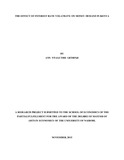The Effect of Interest Rate Volatility on Money Demand in Kenya

View/
Date
2015-11Author
Githinji, Ann N
Type
ThesisLanguage
enMetadata
Show full item recordAbstract
Studies have shown that interest rate volatility has the potential to affect the economic performance and monetary policy decisions of a country through the effect on demand for money. A factor that increases the demand for money may adversely affect economic performance by increasing nominal income and velocity of money circulation. This study was conducted with the main objective of evaluating the existing relationship between money demand and interest rate volatility in Kenya. The study was based on trend analysis of variables of interest, namely, money demand, interest rate volatility, GDP, inflation, exchange rate, population growth rate and financial innovation. Secondary data obtained from various statistical abstracts for the period 1980-2014 was used in this particular study. The frequency of the data collected was annual, thus providing an adequate exploration of the nature and pattern of the study variables. Ordinary Least Square (OLS) was employed as an estimation technique in modeling the relationship between money demand and interest rate volatility. The study variables used were volatility of interest rate as a variable of interest, GDP, interest rates, inflation rates, population growth rate, financial innovation and exchange rates as other control variables. Broad money demand was used as a dependent variable. The study hypotheses were tested at 90%, 95% and 99% confidence intervals. From the study results, it was shown that interest rate volatility, first differences of GDP, inflation rates, financial innovation and first difference of exchange rates were statistically significant while interest rates and the second difference of population growth rates were insignificant in determining money demand in Kenya. Further, volatility of interest rates and first differences of GDP were negatively related to money demand in Kenya. On the other hand, inflation rates, financial innovation and the first difference of exchange rates were found to have a positive relationship with money demand in Kenya. High interest rate volatility can also cause a decline of money velocity which in turn affects money demand. Therefore to control for interest rate volatility to achieve desired demand for money in Kenya, the study suggests that the government through Central Bank together with the parliamentary monetary committee to consider revising monetary tools like open market operations, interest rate controls, credit controls among others. Policymakers and practitioners should ensure availability of derivative instruments to enable savers and investors cope with volatility. In addition, fixed-interest rate term finance contracts can be availed, at a higher cost than variable-interest term finance contracts.
Publisher
University of Nairobi
